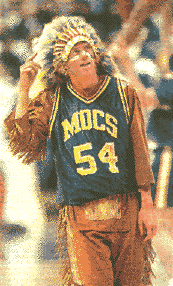





 Indians Rap UTC Mascot
Indians Rap UTC Mascot
KEN LeVON SPEAR
Free Press Staff Writer
"This is racism, pure and simple," said Tom Kunesh, a spokesman for the
Chattanooga InterTribal Association, an advocacy group.
"Whites or 'Euro-Americans' do not own Native American culture, nor do they own
the right to play-act what they believe to be a stereotype of a Native American," said Mr. Kunesh, a Lakota Indian.
Having publicly denounced the mascot last year, members of the group say they are angry because their concerns are being ignored. While minimizing the controversy, UTC officials acknowledge the issue is one they want to handle with care.
"It's not a big issue as far as the general population of the campus is
concerned," said Dr. Charles "Rocky" Renneisen, UTC's vice chancellor for student affairs.
In November, UTC's Student Government Association polled students about mascot
options. A little more than 3 percent, or 256, of the university's 8,331 students cast votes. Chief Moccanooga was favored by 189 of the voters.
"It is incredible ... that 2.2 percent of the UTC student body would hold any
sway over the continued use of a racist mascot," Mr. Kunesh said.
The survey offered other choices: 39 voted to adopt a water moccasin, nine voted to bring back the moccasin shoe, and eight wrote in other choices.
The word "mock" was one of those other choices.
- See "Indians" page A2
Such a mascot would change from game to game, "mocking" the opponent. A
featherless fowl could enter the court if the Mocs were playing a team with an
eagle as a mascot.
The review process is just beginning, officials say.
The final decision on a mascot could come from UTC Chancellor Fred Obear. He has the option to delegate the decision to another committee or have an ad hoc
committee make the decision.
"Whether it stays like that or if there will be any other movement, I don't
know," said Dr. Renneisen, who said that even the American Indian community is
split on the issue.
Input is to be gathered from students, alumni and community groups, officials
say.
Dr. Renneisen points out that Chief Moccanooga's headdress was donated by a
community in Cherokee, N.C. But the American Indian community and other observers question the costume's authenticity.
Critics say the chief is sporting western regalia -- a costume of the Plains
Indians.
John Anderson, a Cherokee Indian [sic; John's actually Tuscarora from upper New
York & Canada] and UTC graduate, said the general feeling of the American Indian community is that Chief Moccanooga's outfit should be "culturally appropriate."
The current costume "promotes a lot of stereotypical thinking. If the mascot
could be more of an accurate portrayal of one of the Southeastern tribes, then it would be a compromise," Mr. Anderson said.
In a Dec. 20 letter to Chancellor Obear, the InterTribal Association wrote that
it hopes "to forego the civil rights litigation" by meeting with him and his
staff "to offer our perspective on the issue which, we believe, is somewhat more relevant give our cultural connection to the the stereotyped mascot."
Mr. Kunesh said UTC has yet to respond.
UTC's last day in session was Dec. 22 and the winter quarter began this week, UTC spokesman Marc Cutright noted.
"To characterize that as non-responsive is a bit of overreaction," he said.
In the InterTribal Association's January 1996 publication, _de las Cenizas_ [sic; _de las Cenizas_ is independently produced by kunesh & Benito Lisardos; CITA does have a half-page ad in the issue], Mr. Kunesh has published an article titled, "Anti-Native American Racism at UTC."
"Perhaps unbeknownst to the UTC Administration, using racist mascots will always be a controversial issue, and discussion on the issue will never get anywhere without involving the people who are being caricatured in the first place," he said.

- "Indians: Rap Mascot", continued from page A1